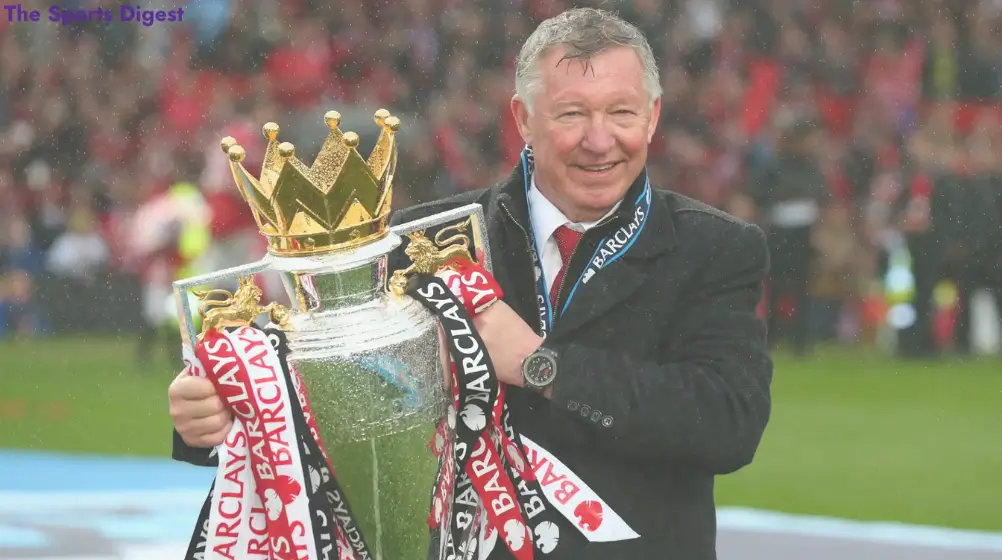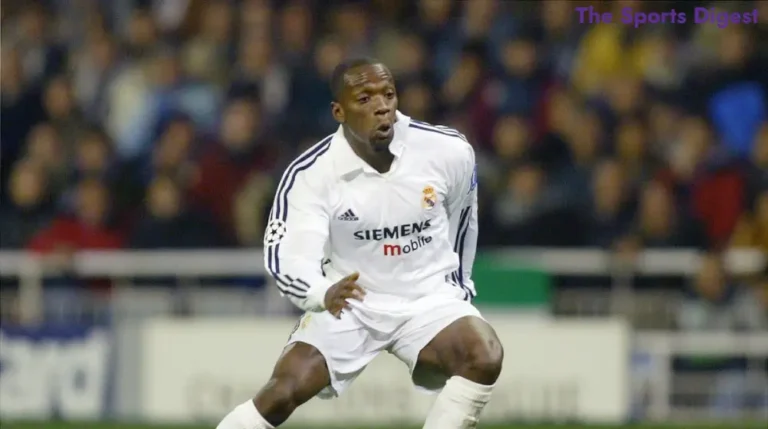Sir Alex Ferguson: Shaping Manchester United’s History
Sir Alex Ferguson, born on December 31, 1941, in Scotland, is regarded as one of the most influential figures in football history. He rose to prominence as a manager, particularly for his tenure at Manchester United, where he is widely regarded as one of the greatest football managers of all time. Sir Alex Ferguson became synonymous with determination, ambition, and leadership. He transformed Manchester United, one of the biggest football clubs in the world, into a dominating force both domestically and internationally.
Table of Contents
Early Playing Days: Success in Scottish Football
Ferguson began his football journey at a young age, joining Queen’s Park in 1958 at just 17 years old. While his playing career was not as illustrious as his managerial career, Sir Alex Ferguson quickly displayed his talent as a striker. He then moved to St. Johnstone in 1960, where he spent four years and scored 19 goals in 37 appearances, demonstrating his natural goal-scoring abilities.
From there, Ferguson moved to Dunfermline Athletic in 1964, where he became a key figure in the team. Under his leadership, Dunfermline was able to compete for league titles. However, despite the team’s potential, they lost in the final of the Scottish Cup to Celtic, a defeat that deeply impacted Sir Alex Ferguson and left a lasting impression on him.
Ferguson then joined Rangers in 1967 for a brief spell before moving to Falkirk, where he spent the majority of his playing career. Despite not achieving major individual success, Sir Alex Ferguson learned the ins and outs of the game and built the foundation for his future managerial career.
The Early Days of Management
After retiring from playing in the early 1970s, Sir Alex Ferguson began his managerial career. His first significant role came at East Stirlingshire, where he began to develop his skills as a manager. He then moved to manage St. Mirren in 1974, where he helped the club move up the Scottish league table.
In 1978, Ferguson took over as manager of Aberdeen, a club that was struggling at the time. Over the next few years, he turned Aberdeen into one of the most competitive teams in Scottish football. During his tenure, Sir Alex Ferguson led the club to three Scottish league titles and a remarkable victory in the European Cup Winners’ Cup in 1983, defeating Real Madrid in the final. This achievement solidified Ferguson’s reputation as a manager who could lead teams to success on both the domestic and international stage
The Big Challenge: Manchester United
In 1986, after years of success at Aberdeen, Ferguson was appointed manager of Manchester United, a club that was struggling both on and off the pitch. United’s performance had dipped in the years prior, and Ferguson had a tough job ahead of him. His first season was challenging, and United finished only 11th in the league. However, Ferguson’s leadership and tactical nous began to show as he made significant changes to the team, improving its discipline and structure.
One of the most significant challenges Ferguson faced was dealing with issues such as player indiscipline and alcohol-related problems within the squad. Players like Bryan Robson and Norman Whiteside needed guidance, and Ferguson was able to provide it. Under his watch, Manchester United started to improve, and by the 1987/1988 season, they finished second in the league, showing positive signs of progress.
The First Trophy: The 1993 Premier League Title
In the 1992/1993 season, Sir Alex Ferguson’s Manchester United won the Premier League title for the first time in 26 years, marking the beginning of an era of dominance for the club. This league win signaled that Ferguson’s rebuild was taking shape, and the addition of key players such as Eric Cantona, Steve Bruce, and Andrei Kanchelskis transformed the squad into one of the most feared in Europe.
The club’s victory that season was crucial, not just in terms of silverware, but also in terms of the culture Sir Alex Ferguson instilled within the team. He built a strong team that was tough both physically and mentally. The success in 1993 was followed by further triumphs, as Manchester United continued to establish themselves as a powerhouse of English football.
Domestic and European Domination: Success in the 1990s
The 1990s were a period of unparalleled success for Ferguson and Manchester United. The team captured the Premier League title again in 1994 and 1996, cementing their dominance in English football. Players such as Roy Keane, Ryan Giggs, and Mark Hughes were central to the team’s success, and Ferguson continued to strengthen the squad by bringing in new talent.
In addition to their league titles, Manchester United also began to enjoy greater success in cup competitions. The 1994 FA Cup was added to the trophy cabinet, and by 1995, Sir Alex Ferguson had established Manchester United as a force to be reckoned with both domestically and internationally.
Ferguson’s impact was not confined to England. The 1991 European Cup Winners’ Cup win against Barcelona was a significant milestone, and Ferguson’s European successes continued throughout the decade. His tactical brilliance, combined with the collective effort of his team, turned Manchester United into a top contender on the European stage.
The European Triumph: The 1999 Treble
Arguably the pinnacle of Sir Alex Ferguson’s career came in 1999 when Manchester United won an unprecedented treble: the Premier League, the FA Cup, and the UEFA Champions League. The club’s performance in the 1998/1999 season remains one of the most remarkable feats in football history.
The treble was highlighted by the unforgettable Champions League final, where Manchester United, trailing Bayern Munich 1-0, scored two goals in injury time to clinch the victory. This dramatic comeback, which saw Teddy Sheringham and Ole Gunnar Solskjaer score in the dying moments, became a symbol of the team’s resilience and determination under Ferguson’s management. The triumph marked a crowning achievement in Ferguson’s career and solidified his place as one of the greatest managers in the history of the game.
Sustained Success: Challenges and Continued Achievements
Even after the remarkable treble in 1999, Ferguson’s Manchester United continued to achieve success. Throughout the early 2000s, United won more Premier League titles and continued to dominate English football. Key signings like Ruud van Nistelrooy, Rio Ferdinand, and Patrice Evra added depth to the squad, and Ferguson maintained a winning formula that kept the team at the top.
Despite occasional setbacks, such as finishing third in the 2001/2002 season without winning any major trophies, Ferguson’s ability to adapt and rebuild was evident. By the mid-2000s, Manchester United was once again firmly in control of English football, with Ferguson continuing to develop his squad to meet the challenges posed by rivals like Arsenal and Chelsea.
In 2008, Ferguson achieved yet another major milestone when Manchester United won the UEFA Champions League for a second time under his stewardship. The final victory against Chelsea in Moscow, where United triumphed in a dramatic penalty shootout, was a testament to the club’s resilience and the tactical brilliance of Ferguson.
The End of an Era: Ferguson’s Retirement
In 2013, after over 26 years in charge of Manchester United, Sir Alex Ferguson announced his retirement from management. The news was met with a sense of disbelief, as Ferguson had been the pillar of the club for more than two decades. Under his leadership, United had won an incredible 13 Premier League titles, 5 FA Cups, and 2 UEFA Champions League trophies. His influence on the club was immeasurable.
Ferguson’s departure marked the end of a golden era for Manchester United, but his legacy continues to resonate. The players he developed and the foundations he laid are still part of the club’s identity. Ferguson’s unique ability to manage big personalities, his tactical acumen, and his unyielding pursuit of excellence have left a lasting impact on football.
Conclusion: Sir Alex Ferguson’s Legacy
Sir Alex Ferguson’s legacy is one of unparalleled success and influence. His achievements with Manchester United have made him a legend in the world of football, and his impact extends far beyond the trophies he won. Ferguson reshaped the culture of English football, and his approach to management continues to inspire coaches and players alike.
As a manager, Ferguson was known for his ability to motivate and challenge his players, pushing them to reach their full potential. His understanding of the game, combined with his leadership skills, made him one of the greatest football managers in history. The legacy of Sir Alex Ferguson will forever be associated with the triumphs of Manchester United and his ability to build a team that dominated both at home and abroad.
Have you ever read an article like this?
There are no reviews yet. Be the first one to write one.






